majoring in linguistics | minoring in chinese | self studying korean
Last active 3 hours ago
Don't wanna be here? Send us removal request.
Text
Cognates in Korean Japanese and Mandarin🇰🇷🇯🇵🇨🇳
I have always liked Korean but I just now have started learning it seriously. I noticed that some of the vocab sounded familiar. I’m just so excited! T ▽ T So here are some cognates I noticed! I’m sure there’s loads more haha~

Coffee - 카피 - コーヒー - 咖啡
Coffee - Keo pi - Kohi - Kāfēi
Tea - 차 - 茶 - 茶
Tea - Cha - Cha - chá
Library - 도서관 - 図書館 - 图书馆
Library - Do seo gwan - Toshokan - Tú shū guǎn
Zoo - 동물원 - 動物園 - 动物馆
Zoo - Dong mul weon - Dou butsu en - Dòng wù guǎn
News - 신문 - 新聞 - 新闻
News - Shin mun - Shin bun - Xīn wén
Chair - 의자 - 椅子 - 椅子
Chair - Eui ja - i su - Yǐ zi
Teacher/ Mister - 선생님 - 先生 -先生
Teacher/ Mister - Seon saeng nim - Sen sei - Xiān shēng
Doctor - 의사 - 医者 - 医生
Doctor - Eui sa - i sha - Yī shēng
Tank - 전차 - 戦車 - 战车
Tank - Jeon cha - Sen sha - Zhàn chē

Here’s some that are similar to the Chinese or Japanese word
Car - 차 - 車 - 车
Car - Cha - Kuruma - Chē
Bag - 가방 - 鞄 - 包
Bag - Ka bang - Kaban - Bāo
Bank - 은행 - 銀行 - 银行
Bank - Eun haeng - Gin kou - Yín háng
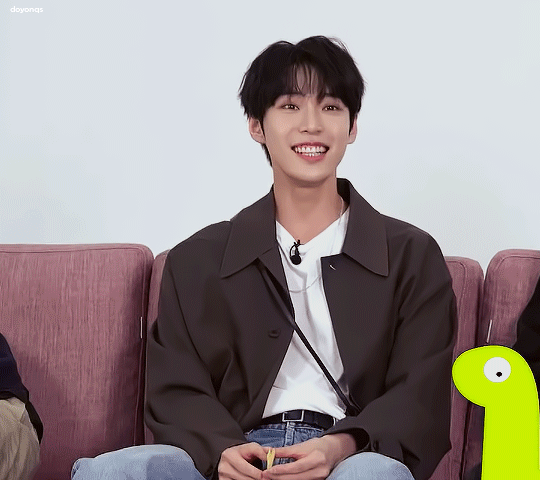
-My brain when I heard the vocabs hahaha ≧ω≦
안녕~★
174 notes
·
View notes
Photo

I believe in free education, one that’s available to everyone; no matter their race, gender, age, wealth, etc… This masterpost was created for every knowledge hungry individual out there. I hope it will serve you well. Enjoy!
FREE ONLINE COURSES (here are listed websites that provide huge variety of courses)
Alison
Coursera
FutureLearn
open2study
Khan Academy
edX
P2P U
Academic Earth
iversity
Stanford Online
MIT Open Courseware
Open Yale Courses
BBC Learning
OpenLearn
Carnegie Mellon University OLI
University of Reddit
Saylor
IDEAS, INSPIRATION & NEWS (websites which deliver educational content meant to entertain you and stimulate your brain)
TED
FORA
Big Think
99u
BBC Future
Seriously Amazing
How Stuff Works
Discovery News
National Geographic
Science News
Popular Science
IFLScience
YouTube Edu
NewScientist
DIY & HOW-TO’S (Don’t know how to do that? Want to learn how to do it yourself? Here are some great websites.)
wikiHow
Wonder How To
instructables
eHow
Howcast
MAKE
Do it yourself
FREE TEXTBOOKS & E-BOOKS
OpenStax CNX
Open Textbooks
Bookboon
Textbook Revolution
E-books Directory
FullBooks
Books Should Be Free
Classic Reader
Read Print
Project Gutenberg
AudioBooks For Free
LibriVox
Poem Hunter
Bartleby
MIT Classics
Many Books
Open Textbooks BCcampus
Open Textbook Library
WikiBooks
SCIENTIFIC ARTICLES & JOURNALS
Directory of Open Access Journals
Scitable
PLOS
Wiley Open Access
Springer Open
Oxford Open
Elsevier Open Access
ArXiv
Open Access Library
LEARN:
1. LANGUAGES
Duolingo
BBC Languages
Learn A Language
101languages
Memrise
Livemocha
Foreign Services Institute
My Languages
Surface Languages
Lingualia
OmniGlot
OpenCulture’s Language links
2. COMPUTER SCIENCE & PROGRAMMING
Codecademy
Programmr
GA Dash
CodeHS
w3schools
Code Avengers
Codelearn
The Code Player
Code School
Code.org
Programming Motherf*?$%#
Bento
Bucky’s room
WiBit
Learn Code the Hard Way
Mozilla Developer Network
Microsoft Virtual Academy
3. YOGA & MEDITATION
Learning Yoga
Learn Meditation
Yome
Free Meditation
Online Meditation
Do Yoga With Me
Yoga Learning Center
4. PHOTOGRAPHY & FILMMAKING
Exposure Guide
The Bastards Book of Photography
Cambridge in Color
Best Photo Lessons
Photography Course
Production Now
nyvs
Learn About Film
Film School Online
5. DRAWING & PAINTING
Enliighten
Ctrl+Paint
ArtGraphica
Google Cultural Institute
Drawspace
DragoArt
WetCanvas
6. INSTRUMENTS & MUSIC THEORY
Music Theory
Teoria
Music Theory Videos
Furmanczyk Academy of Music
Dave Conservatoire
Petrucci Music Library
Justin Guitar
Guitar Lessons
Piano Lessons
Zebra Keys
Play Bass Now
7. OTHER UNCATEGORIZED SKILLS
Investopedia
The Chess Website
Chesscademy
Chess.com
Spreeder
ReadSpeeder
First Aid for Free
First Aid Web
NHS Choices
Wolfram Demonstrations Project
Please feel free to add more learning focused websites.
*There are a lot more learning websites out there, but I picked the ones that are, as far as I’m aware, completely free and in my opinion the best/ most useful.
533K notes
·
View notes
Text
Free Online Language Courses
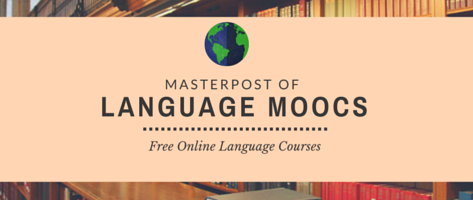
Here is a masterpost of MOOCs (massive open online courses) that are available, archived, or starting soon. I think they will help those that like to learn with a teacher or with videos. You can always check the audit course or no certificate option so that you can learn for free.
American Sign Language
ASL University
Sign Language Structure, Learning, and Change
Arabic
Arabic Without Walls
Madinah Arabic
Moroccan Arabic
Armenian
Depi Hayk
Bengali
Learn Bangla (Register to see course)
Catalan
Parla.Cat
Speak Cat
Chinese (Mandarin)
Beginner
Chinese for Beginners
Chinese Characters for Beginners
Chinese for HSK 1
Chinese for HSK 2
Chinese for HSK 3 I & II
Chinese for HSK 4
Chinese for HSK 5
Mandarin Chinese Level I
Mandarin Chinese Essentials
Mandarin Chinese for Business
More Chinese for Beginners
Start Talking Mandarin Chinese
UT Gateway to Chinese
Intermediate
Intermediate Business Chinese
Intermediate Chinese Grammar
Mandarin for Intermediate Learners I
Dutch
Introduction to Dutch
English
Online Courses here
Resources Here
Faroese
Faroese Course
Finnish
A Taste of Finnish
French
Beginner
AP French Language and Culture
Elementary French I & II
Français Interactif
Vivre en France - A1
Vivre en France- A2
Intermediate & Advanced
French Intermediate course B1-B2
Passe-Partout
Travailler en France A2-B1
Vivre en France - B1
German
Beginner
Deutsch im Blick
German Project
German at Work
Goethe Institute
Gwich’in
Introduction to Gwich’in Language
Hebrew
Biblical Hebrew
UT Austin
Hindi
A Door into Hindi
Virtual Hindi
Icelandic
Icelandic 1-5
Indonesian
Learn Indonesian
Irish
Irish 101, 102, 103, 104, 105, 106, 107
Italian
Beginner
Beginner’s Italian I
Introduction to Italian
Intermediate & Advanced
AP Italian Language and Culture
Intermediate Italian I
Advanced Italian I
Japanese
Genki
Japanese JOSHU
Japanese Pronunciation
Marugoto Courses
Tufs JpLang
Korean
Beginner
First Step Korean
How to Study Korean
Introduction to Korean
Learn to Speak Korean
Pathway to Spoken Korean
Intermediate
Intermediate Korean
Norwegian
Introduction to Norwegian I, Norwegian II
Norwegian on the Web
Persian
Easy Persian
PersianDee
Polish
Online Course
Portuguese
Pluralidades em Português Brasileiro
Russian
Beginner
A1 Course
I speak Russian
Intermediate
B1 Course
B1+ Course
B2.1 Course
B2.2 Course
Spanish
Beginner
AP Spanish Language & Culture
Basic Spanish I, Spanish II
Spanish for beginners
Spanish for Beginners 1, 2, 3, 4, 5, 6
Spanish Vocabulary
Advanced
Corrección, Estilo y Variaciones
Leer a Macondo
Swahili
Online Course
Turkish
Online Course
Ukrainian
Read Ukrainian
Speak Ukrainian
Welsh
Beginner’s Welsh
Discovering Wales
Yoruba
Yorùbá Yé Mi
Multiple Languages
Ancient Languages
More Language Learning Resources & Websites!
Last updated: May 2019
215K notes
·
View notes
Text
Learning Languages and How to Make it Fun
(gifs not mine, credit to the artist)

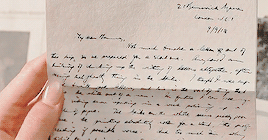
How does a child learns? Immersion
So you gotta dive deep
Find songs that you like. You don't have to understand, you just have to enjoy the song.
Listen them at least once a day. The idea is for you to get familiar with the sounds.
Once you have already heard them too many times (without getting tired of them) look for the lyrics. In their native language, not a translation.
If you can read in that language, then try reading them. Print them if you have to or write them down (this is better) and as you listen to the song try to sing.
If there's a word/sentence you like because it sounds pretty, mark it.
If there's a word you don't know how to/can't pronounce, mark it.
For example, I have a journal in which I write Japanesse Kanji that I find beautiful (whether is because of the meaning or the symbol itself is pretty)
Once you are familiar with the song look for a translation.
Check those words you have marked with the translation.
While looking for definitions it's better if you find images (so can have an idea of what that word is) instead of a definition in your language (unless is a long/complicated concept).
Movies, you must watch movies in that language. Better if they are from that country. (It can also be a doubled movie, perhaps you could look for one of your favorites)
Watch them with subtitles (in your language) once or twice. Then watch them again but this time without subtitles or with subtitles of said language. (You already know the plot, so you can still understand what's going on)
If you like to read, look for children literature. It's easy and fun.
Keep reading even if you don't understand a single sh*t. It doesn't matter.
Mark again those words you like, don't know the meaning or can't pronounce.
Write at least one sentence every day. It doesn't have to be right, it doesn't have to be long or poetic, you just gotta write.
If you still don't know much about grammar (enough to formulate a sentence on your own) then write a quote from one of those songs, movies or books you read. Again it doesn't matter if you don't understand what are you writing.
If you already know another language, try to learn the new language with that one. For example, I learn german from english instead of my native language spanish.
Videogames. In my experience this is amazing. You have no idea idea how much I learned english just from games.
You have fun playing, engaged with a story, while constantly hearing the language. You don't even have to pay attention at what they are saying, eventually you'll figure it out. It's very intuitive.
And because games, usually, requires that you spend many hours playing you will have a lot of practice without actually studying.
Some games, if you look on the settings menu, even have other languages instead of english. For example I played Assassin's Creed Brotherhood in italian and french and AsC III in russian and japanese (the voice actors are fantastic).
Seriously, videogames are freaking amazing for learning.
The idea of this, is that you can imitate the learning process a child does, while also having fun and enjoying it. Kids learn by making mistakes, by playing with words and by being constantly surrounded with the language. At first, kids have no idea what they are doing, they just repeat what they see and hear. So it's okay if you don't know what are you doing, take that pressure off. This is not school/college, this is just you trying to learn a culture. So be kind and patient with yourself.
LEARNING SHOULD BE FUN, be creative with your methods and try everything (so you can find what you are comfortable with). It is scientifically proved that if you like what you are studying and having fun it will be 10x easier to assimilate and remember the knowledge you are acquiring.
14K notes
·
View notes
Photo

Mixture of plants, mixture technique on paper
985 notes
·
View notes
Text
TIPS FOR LEARNING A LANGUAGE
Your brain has no word limit. “Memorise every word you encounter” That’s not a requirement, that’s an impossible goal you should set for yourself. Learning vocabulary is like a plate that slowly turns into a bowl the more water you pour in it(weird metaphor I know but bear with me). You can learn 100 words and you’ll quickly forget a lot of them. You can learn 10 words and you’ll quickly forget some of them. But learning 30 words out of 100 is much better than learning 8 out of 10(you feel me?). The plate will overfill regardless of how much water you pour in there, so just pour as much as you can and turn that sucker into a bowl.
Simply put: The more you learn, the easier it gets to learn.
There’s no such thing as a useless word. Vehicle. Spaceship. Run. Skedaddle. Are all important words. Never ignore a word because you think it’s useless. It’ll come to you, maybe in the next test, maybe in a conversation with a stranger, maybe written in scary red paint on the wall of a sketchy neighbourhood telling you to skedaddle. You need it.
Speak your target language*duh*. *Imagine if you will, you’re in France with little to no vocabulary. You walk into a hotel, worried as to how you’re gonna communicate with the person at the desk. As soon as your eyes meet he greets you saying in the most fluent english accent “Hello there! How may I help you?” You sigh a sigh of relief, however you remember that you’re in France, you’re committed to learning the French language. You take a deep breath and respond with “Salut! je maple Timothy je want une casa” Now obviously there’s so much wrong there. But it’s so much better than speaking english because you’ll learn what a room is, and you’ll even learn a word in Spanish.
You’ll embarrass yourself in conversations. No advice here just telling you a fact. A Chinese guy once asked me if I understood something and I simply replied with “I am bread” So yeah good luck.
Idioms. Learn them. They’re awesome.
Think in target language. Weird I know. But seriously if you know how to think a sentence in your target language, do it. You’ll be more comfortable saying it and you’ll revise what you’ve learnt. As well as discover what you forgot.
Lie. When it’s harmless. Try telling a taxi driver you’re Sri Lankan see where that takes you. Unless you are Sri Lankan in which case you’re Cambodian. Say you married an Austrian pilot, or own a pet rock, or maybe related to the queen. You’ll have much more fun and useful conversations. (P.s. If you’re half-Sri Lankan half-Cambodian you are officially Martian.)
Helpful Apps:
HiNative: Allows you to ask native speakers what something means, how it’s used, whether your sentence is correct, or simply any question you have about said language or even culture.
Flashcards: Pretty self explanatory. Make your own flashcards, one side in your language, one side in target language. Perfect in revising words. You can also download decks that other people have created and made public. Obviously you can use it for other subjects too.
HelloTalk: Texting people of target language who want to learn your native language. Help each other learn each other’s language and has great features for correcting sentences and grammar.
(dictionary): No that’s not the name of the app. Having google translate is helpful and all but try finding a language specific App(e.g French to English). It’s also good to have a dictionary. All words. Easily accessible. Works offline. (For Chinese that App is Pleco)
8K notes
·
View notes
Text
bugs in mandarin

昆虫 kūnchóng insect
蚂蚁 mǎyǐ ant
白蚁 báiyǐ termite
蜜蜂 mìfēng bee
蜂蜜 fēngmì honey
黄蜂 huángfēng wasp
甲壳虫 jiǎkéchóng beetle
蛾 é moth
蝴蝶 húdié butterfly
茧 jiǎn cocoon
毛毛虫 máomáochóng caterpillar (毛虫 is also okay)
蟋蟀 xīshuài cricket
蚱蜢 zhàměng grasshopper
螳螂 tángláng praying mantis
蟑螂zhāngláng cockroach
小强 xiǎoqiáng cockroach (slang)
蜈蚣 wúgōng centipede
蜻蜓 qīngtíng dragonfly
苍蝇 cāngyíng fly
蚊子 wénzi mosquito
瓢虫 piáochóng ladybug
蜘蛛 zhīzhū spider
萤火虫 yínghuǒchóng firefly, lightning bug
蚯蚓 qiūyǐn earthworm (i don’t think this is an insect but who cares)
害怕 hàipà to be afraid
我害怕蜘蛛 (I’m afraid of spiders)
1K notes
·
View notes
Text
Chinese Measure Words

个 gè: for people, abstract things and objects | Ex: 我有一个老师。
口 kǒu: for family people | Ex: 我家有四口人。
只 zhī: for animals | Ex: 我爸爸家有三只狗。
条 tiáo: for long and narrow things | Ex: 她有两条鱼。
张 zhāng: for flat things | Ex: 教室里有五张桌子。
把 bǎ: for objects that can be grasped by hand | Ex: 我房间里有一把椅子。
本 běn: for books | Ex: 桌子上有四本书。
支 zhī: for long and thin things | Ex: 笔袋里有一支笔。
家 jiā: for establishments (house, hotel …) | Ex: 我哥哥开了一家公司。
块 kuài: for portions or pieces | Ex: 来吃块西瓜吧。
岁 suì: for years (old) | Ex: 我今年40岁。
棵 kē: for trees | Ex: 这棵树又高又大。
台 tái: for machines | Ex: 这台电脑是新买的。
双 shuāng: for pairs | Ex: 一双筷子。
辆 liàng: for vehicles | Ex: 一辆汽车。
篇 piān: for articles and texts | Ex: 这篇报道是我写的。
节 jié: for time periods | Ex: 我们下午只有一节课。
杯 bēi: for liquid (glass; cup) | Ex: 我有一杯牛奶。
2K notes
·
View notes
Text
Chinese New Year Vocabulary

新年快乐 xīnnián kuàilè happy new year
春节 chūnjié Spring festival
猪年 zhūnián pig’s year
新年 xīnnián new year
除夕 chúxī new year’s eve
农历 nónglì lunar calendar
初一 chūyī the first day of a month in the lunar calendar
红包 hóngbāo red envelope with money
好运 hǎoyùn good luck
烟花 yānhuā fireworks
鞭炮 biānpào firecrackers
窗花 chuānghuā paper-cut for window decoration
福 fú good fortune
对联 duìlián couplet
灯笼 dēnglong lantern
饺子 jiǎozi dumplings
年夜饭 niányèfàn family dinner on the chinese new year’s eve
2K notes
·
View notes
Photo
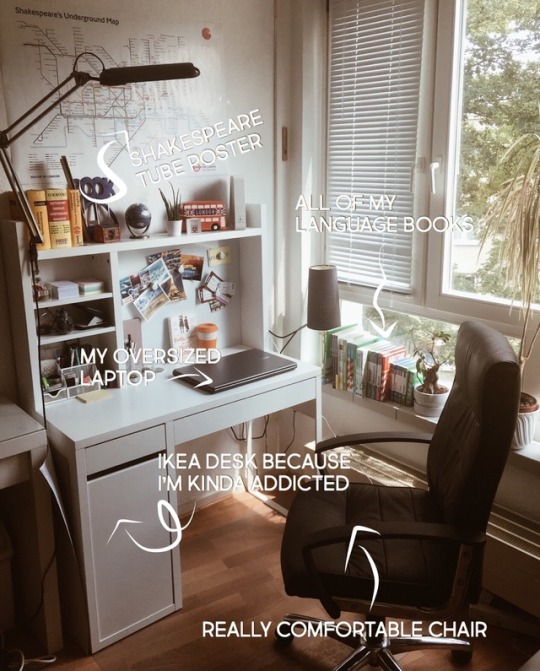
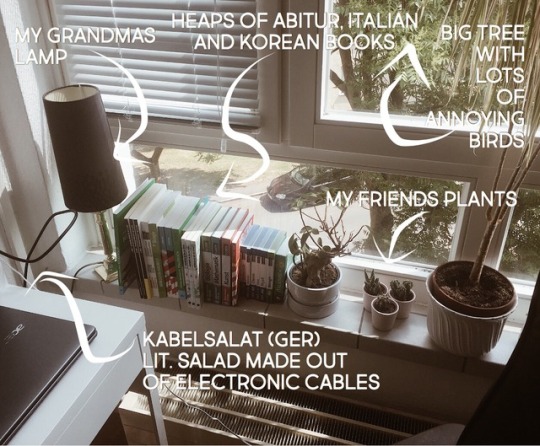
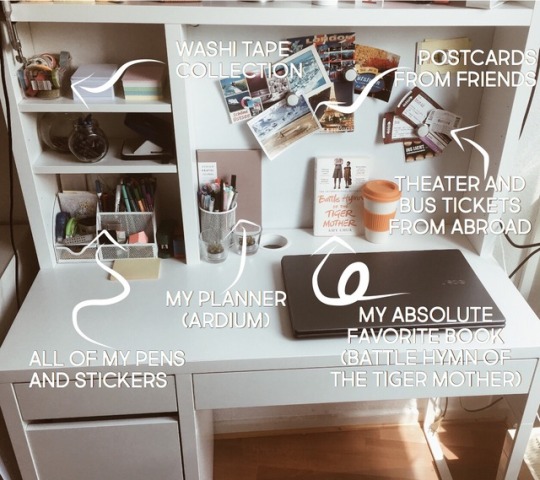
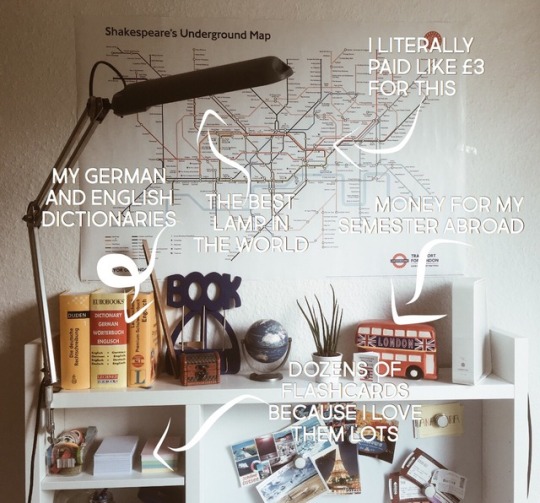
I thought it was time to show all of you my desk :) I put some personal annotations on it, if you have any more questions you can just send me a message! Anni
10K notes
·
View notes
Text
“i didn’t sign up for a goddamn history/literature/art course” as a complaint about languages courses absolutely baffle me because history, culture, everything is important when learning a language, not just the grammar, karen
12K notes
·
View notes
Text
space vocab in mandarin

so i’ve had this in my drafts for ages and i just never got around to completing it, but then i saw @malteseboy ‘s post and was reminded that, instead of sitting around doing nothing during my summer break, i could actually finish this list i started almost seven months ago so here it is
宇宙空间 yǔzhòu kōngjiān space
宇宙 yǔzhòu universe
星星 xīngxīng star
星座 xīngzuò constellation
星系 xīngxì galaxy
星云 xīngyún nebula
小行星 xiǎo xíngxīng asteroid
彗星 huìxīng comet
黑洞 hēidòng black hole
流星 liúxīng meteor
日食 rì shí solar eclipse
月食 yuè shí lunar eclipse
行星 xíngxīng planet
太阳系 tàiyángxì solar system
太阳 tàiyáng sun
水星 shuǐxīng mercury
金星 jīnxīng venus
地球 dìqiú earth
月球 yuèqiú moon
火星 huǒxīng mars
木星 mùxīng jupiter
土星 tǔxīng saturn
天王星 tiānwángxīng uranus
海王星 hǎiwángxīng neptune
冥王星 míngwángxīng pluto
轨道 guǐdào orbit
绕地 ràodì to orbit the earth
送上轨道 sòng shàngguǐdào to send into orbit
盘旋 pánxuán to circle, to go around, to orbit
重力 zhònglì gravity
满月 mǎnyuè full moon
新月 xīn yuè new moon
弦月 xián yuè crescent moon
太空探索 tàikōng tànsuǒ space exploration
宇航员 yǔháng yuán astronaut
太空服 tàikōng fú space suit
航天飞机 hángtiān fēijī space shuttle
人造卫星 rénzào wèixīng satellite
发射 fāshè to launch/fire (a rocket)
发射架 fāshè jià launch pad
空间站 kōngjiānzhàn space station
天文学 tiānwénxué astronomy
天文学家 tiānwénxué jiā astronomet
望远镜 wàngyuǎnjìng telescope/binoculars
天文望远镜 tiānwén wàngyuǎnjìng telescope
三脚架 sānjiǎojià tripod
3K notes
·
View notes
Text
Mandarin Romance Vocab

As a hopeless romantic, there’s no vocab list that comes easier to me! 浪漫 - romance [làngmàn] 浪漫的 - romantic [làngmàn de] 爱情 - love [àiqíng] 夫妻 - couple [fūqī] 婚礼 - marriage [hūnlǐ] 权宜婚姻 - marriage of convenience [quányí hūnyīn] 婚礼 - wedding [hūnlǐ] 巧克力 - chocolate [qiǎokèlì] 花 - flowers [huā] 礼物 - gift [lǐwù] 心脏 - heart [xīnzàng] 心形物 - heart (shape) [xīnxíngwù] 感情问题 - matters of the heart [gǎnqíng wèntí] 使某人伤心 - to break somebody’s heart [shǐ mǒurén shāngxīn] 心碎了 - to have a broken heart [xīnsuìle] 是某人所关心的 - to be close/dear to one’s heart [shì mǒurén suǒ guānxīn de] 调情者 - flirt [tiáoqíngzhě] 风流韵事 - affair [fēngliú yùnshì] 情人 - lover [qíngrén] 丈夫 - husband [zhàngfu] 妻子 - wife [qīzi] 男朋友 - boyfriend [nánpéngyou] 女朋友 - girlfriend [nǚpéngyou] 心上人 - sweetheart [xīnshàngrén] 亲爱的 - darling [qīn'ài de] 喜爱 - affection [xǐ'ài] 亲爱的 - sweetheart [qīn'àide] 亲昵 - intimacy [qīnnì] 情爱 - passion [qíng'ài] 情人节 - Valentine’s Day [Qíngrén Jié] 吻 - kiss [wěn] 拥抱 - cuddle [yōngbào] 一起 - together [yīqǐ] 吸引力 - attraction [xīyǐnlì] 宝贝 - baby [bǎobèi] 亲密的关系 - relationship [qīnmì de guānxì] 爱 - to love [ài] 和 … 约会 - to date [hé … yuēhuì] 结婚 - to marry [jiéhūn] 调情 - to flirt [tiáoqíng] 接吻 - to kiss [jiēwěn] 吻某人一下 - to give somebody a kiss [wěn mǒurén yīxià] 搂抱 - to cuddle [lǒubào] 引起 - to attract [yǐnqǐ] 关系亲密 - to have a good relationship [guānxì qīnmì] 喜欢某人 - to feel affection for somebody [xǐhuān mǒurén] 赢得某人的爱慕 - to win somebody’s affection [yíngdé mǒurén de àimù] 迷恋某人 - to have a crush on somebody [míliàn mǒurén] 受到某人的宠爱 - to be somebody’s darling [shòudào mǒurén de chǒng'ài] 发生暧昧关系 - to have an affair [fāshēng àimèi guānxi] 恋爱 - to be in love [liàn'ài] 爱上 - to fall in love [àishàng] 做爱 - to make love [zuò'ài] 一见钟情 - love at first sight [yī jiàn zhōngqíng] 我爱你。- I love you. [Wǒ ài nǐ.] 你没事吧?- Are you okay, love? [Nǐ méi shì ba?] 我想你 - I miss you [wǒ xiǎng nǐ] 我想跟你在一起 - I want to be with you [wǒ xiǎng gēn nǐ zài yīqǐ] 我喜欢你 - I fancy you [wǒ xǐhuan nǐ] 你愿意嫁给我吗? - Will you marry me? [nǐ yuànyi jià gěi wǒ ma?] 我的心里只有你 - In my heart there is only you [wǒ de xīnlǐ zhǐ yǒu nǐ] 跟你在一起真开心 - I’m so happy with you [gēn nǐ zài yīqǐ zhēn kāixīn]
Shoutout to fluentinmandarin, particularly in the phrases section of this list!
3K notes
·
View notes
Text
Study organization- notebooks
I love stationery of all kinds, especially notebooks. And when you’re planning on studying, of course you need notebooks for taking notes and practicing! In this post, I’ll talk a little about my notebooks.
What kind(s) of notebook(s) do you use?
My personal preference is for spiral notebooks. I used to use notebooks that just opened like normal books, but they never liked to stay flat and they took up too much space on my desk. It’s funny because I used to hate spirals back when I was younger and way into drawing because the pages were more free to move against each other which led to more smudging, but I love spirals so much for note taking. They lay flat with no problem, which is the biggest thing for me. The spiral does get in the way of my hand sometimes, but it’s a minor annoyance.
I also consider the quality of the paper when buying my notebooks. It doesn’t have to be super high quality, but I just can’t deal with paper the quality of standard US looseleaf. It’s too thin and, more importantly, the surface is too rough. Paper with too rough a surface has led to the early death of too many of my pens—if you use fine-tip pens, size 0.5 or lower, and find they stop writing before the ink runs out—little bits from poor-quality paper probably got into the tip and ruined it. The paper I like the most feels a little bit weighty and nice and smooth!
Hardcover or softcover is also a choice to make! I use both, types:
Left to right- hardcover lined notebook, softcover lined notebook, softcover 원고지 squared paper notebook
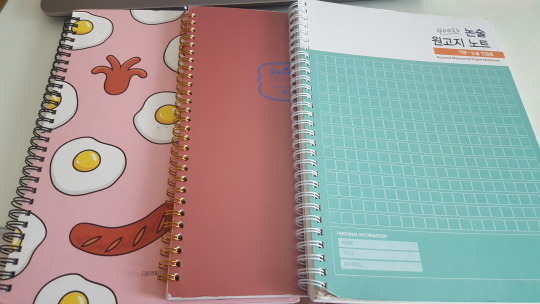
How many notebooks do you use?
I have three main types of notebooks! I’ll go over each type:
Grammar notebooks
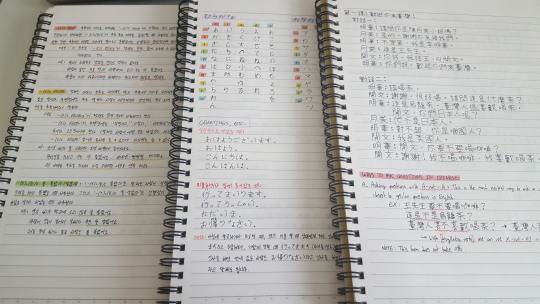
My grammar notebooks are all hardcover. I use them to collect grammar explanations and other important notes. I write them as cleanly as possible and even use my many colorful highlighters to make them look a little nicer. If I need to know about a grammar point that I have already learned, I open my grammar notebook for the right language and find it. This way, I don’t have to remember which textbook or source I saw a certain grammar point or explanation in—if it’s important, I write it down in my grammar notebook! So, my grammar notebooks are mashups of multiple texts and sources. These are for reference only; I don’t do any practice or extra writing in them. Nothing but the facts!
Practice notebooks
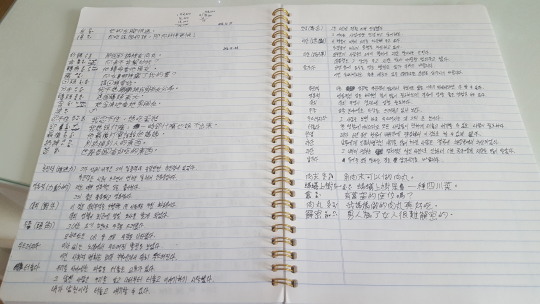
My practice notebook is where I write down definitions of new words I learned, practice sentences for my vocab flashcard words, breakdowns of articles I’ve studied on my Chinese reader apps… I guess calling it a “practice notebook” makes its purpose pretty self-explanatory. It’s nothing special; I write quickly and messily in it, and when it gets full, I can just throw it in the recycling bin and start a fresh one. My practice notebook is a softcover spiral.
Chinese article notebook
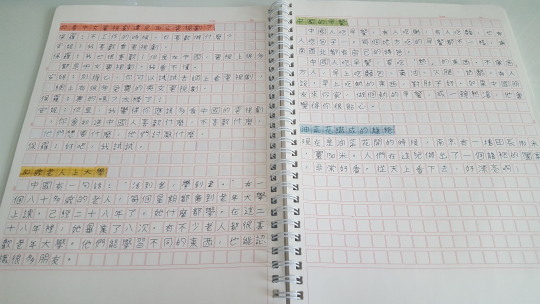
Korean squared paper—or I guess any squared paper—is wonderful for writing Chinese characters. Once I’ve encountered an article in a Chinese reader app and broken it down in my practice notebook, I rewrite it cleanly in my article notebook so I can easily find and read it again later.
I don’t always have all of my notebook types with me. If I plan on studying grammar, I will bring the correct grammar notebook along, and if I plan on studying Chinese articles, I might have my article notebook with me, but not always. However, my practice notebook is always in my bag!
How do you organize your notes and all? For those of you who might be struggling to get your notes together, I hope this helped!
Happy studying~
5K notes
·
View notes
Text
How To Use Movies To Learn a Language

Greetings, Polyglots! I’m back with another post about how to use movies to learn languages!
I’ve noticed a trend among language learners. Especially among those learning English. Those who spoke English the most natural and fluently have all said that they frequently use movies to learn English. I’m telling you, it’s uncanny! I’ve taught English in three countries and in every country the most standout students have always said that they watched videos and movies for idioms and phrases. The result was almost always natural and fluent sounding English. So I began to wonder do movies work to help you learn a language and how do you watch a movie to learn a language anyway!? Movies are like an hour to two hours long! I don’t have the patience for that.
Movies can, however, help you learn languages in a more natural and casual way. Depending on the genre of the movie, you can learn some interesting vocabulary as well. Movies and television shows are very important for language learning, because they not only teach proper use of grammar and vocabulary, they also introduce you to the humor and culture of the people who’s language you’re studying. After only one or two weeks using movies learning Chinese, my casual Chinese has certainly improved and I have learned a few funny phrases to keep things light too. So how do you use movies to learn languages? Here’s how:
Keep reading
10K notes
·
View notes

